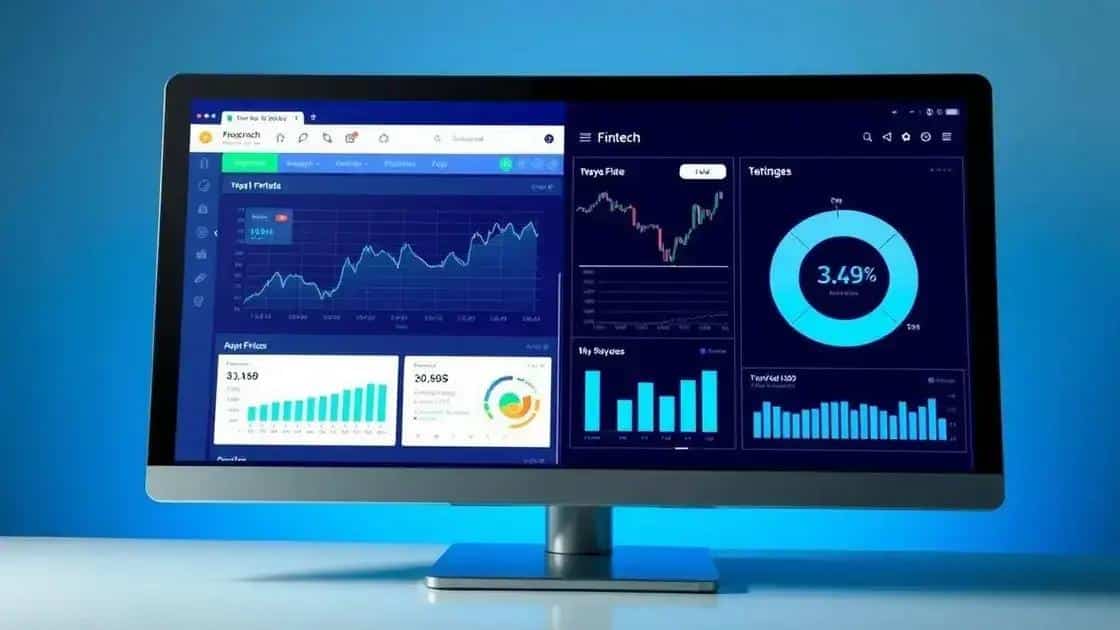What is fintech? Understand its impact and benefits

Fintech revolutionizes financial services by offering consumers and businesses enhanced convenience, reduced costs, and better access to innovative solutions, while also presenting challenges like regulatory compliance and data security.
Fintech is changing the way we think about money and financial services. Have you ever wondered how technology could streamline banking and investing? In this article, we’ll dive into what fintech is all about.
Understanding fintech and its key features
Understanding fintech is essential in today’s digital age. This technology merges finance with technology to enhance financial services. It broadens access to banking, investments, and loans for more people than ever before.
Key Features of Fintech
Fintech includes various innovations that simplify and streamline financial processes. Here are some key features:
- Mobile Payments: Fintech allows users to make secure payments through their smartphones, enhancing convenience.
- AI and Analytics: With artificial intelligence, fintech companies analyze data to improve customer experiences and services.
- Peer-to-Peer Lending: This feature connects borrowers directly with lenders, minimizing fees and providing better rates.
- Blockchain Technology: This secure method records transactions, making them transparent and less susceptible to fraud.
Each of these features plays a crucial role in how we manage our money. Fintech also promotes savings by offering users tools that help control spending. For instance, budgeting apps can track expenses and provide insights into spending habits.
Moreover, fintech introduces automated investment services, known as robo-advisors. These platforms manage portfolios for users based on their financial goals. The best part? They typically charge lower fees than traditional advisors, making investment accessible for everyone.
As technology continues to evolve, expect the features within fintech to develop further. New tools and services will emerge, shaping the future of how people interact with their finances.
The rise of fintech in the financial industry

The rise of fintech in the financial industry is notable and transformative. As technology advances, traditional banking methods are being challenged by innovative solutions that promote efficiency and accessibility.
Shift Towards Digital Platforms
People are now banking on their mobile devices more than ever. This shift towards digital platforms allows users to manage accounts, pay bills, and even apply for loans with a few taps. The convenience of having financial services readily available on smartphones is reshaping consumer expectations.
- Enhanced Accessibility: Fintech services reach underserved populations who may lack access to conventional banks.
- Speed and Efficiency: Online platforms enable quicker processing of loans and transactions.
- User-Friendly Interfaces: Fintech applications often have intuitive designs that improve user experiences.
- Cost-Effectiveness: Many fintech solutions lower fees compared to traditional banking options.
Moreover, the demand for personalized financial solutions is growing. With advancements in data analytics, fintech companies can cater to individual needs, offering tailored advice and services. For instance, budgeting apps provide insights based on spending habits, helping users manage their finances smarter.
Regulatory changes also play a role in the rise of fintech. Governments are becoming more supportive of technology-driven solutions, recognizing their potential to boost the economy. As a result, more startups are emerging, aiming to disrupt financial services and introduce innovative products.
The combination of changing consumer preferences, supportive regulations, and technological advancements continues to drive the popularity of fintech in the financial industry. With each passing day, more individuals and businesses are embracing these modern alternatives to traditional banking, paving the way for a more inclusive and efficient financial landscape.
Benefits of fintech for consumers and businesses
The benefits of fintech for consumers and businesses are significant and far-reaching. As technology reshapes the financial landscape, both individuals and organizations are discovering the advantages of adopting these innovative solutions.
For Consumers
Consumers enjoy a wide range of benefits from fintech services. One major advantage is increased convenience. With mobile banking apps, users can manage their finances anytime and anywhere. This flexibility allows for seamless transactions and easier bill payments.
- Lower Fees: Many fintech platforms offer services with reduced fees compared to traditional banks, saving consumers money.
- Customized Financial Products: Fintech companies often provide personalized services, such as tailored loans and investment advice.
- Faster Transactions: Consumers can send and receive money instantly, making financial interactions quicker and more efficient.
- Better Financial Management: Budgeting tools and apps help users track their spending and savings effectively.
Furthermore, fintech promotes financial literacy by providing valuable resources and tools. This empowers consumers to make informed decisions about their finances.
For Businesses
Organizations also experience numerous benefits through fintech. Automated processes can lead to significant cost savings and improve efficiency. Companies can streamline operations by using fintech solutions for payroll, invoicing, and customer payments.
- Access to Capital: Fintech platforms often provide easier access to loans and investment opportunities.
- Improved Cash Flow Management: Businesses can use real-time data analytics to manage their cash flow more effectively.
- Risk Mitigation: Enhanced security features protect businesses from fraud and cyber threats.
- Scalability: Fintech solutions can quickly adapt to the changing needs of businesses as they grow.
The integration of fintech solutions not only enhances operational efficiency but also drives innovations in products and services. As more consumers and businesses embrace fintech, the advantages will continue to evolve, creating a more dynamic financial ecosystem.
Challenges and future trends in fintech

The world of fintech is exciting, but it also faces several challenges. Understanding these issues is important for both consumers and businesses as they navigate this fast-paced landscape.
Key Challenges
One major challenge is regulatory compliance. As fintech continues to evolve, governments are developing new regulations. Keeping up with these rules can be difficult for startups and established companies alike.
- Data Security: Protecting customer data is crucial. Cybersecurity threats are a constant concern, and companies must invest in robust security measures.
- Market Competition: The fintech space is crowded. Many startups are competing for the same customers, making it essential to differentiate services.
- Trust Building: New financial technologies often face skepticism. Gaining trust from users can be a significant hurdle.
- Technological Challenges: Rapid technological changes mean companies must constantly update their systems to stay relevant.
Despite these hurdles, the future of fintech looks bright. Innovations continue to emerge, shaped by changing consumer needs and advancements in technology. For instance, artificial intelligence plays a growing role in personalized financial services.
Future Trends
One important trend is the rise of digital currencies. As cryptocurrencies gain popularity, traditional banks are exploring blockchain technology to improve transactions. This could lead to faster and cheaper international transfers.
- Open Banking: More companies are adopting open banking principles, allowing third-party apps to access user data to provide better services.
- Regulatory Technology: Solutions that streamline compliance processes are becoming more common, helping companies navigate complex regulations efficiently.
- Green Finance: Sustainability is becoming crucial in the financial sector. Fintech firms that prioritize eco-friendly practices may lead the future.
- AI and Machine Learning: These technologies will continue to enhance customer experiences by providing tailored financial advice and automating processes.
As fintech evolves, staying aware of these challenges and trends will be essential. This understanding can help users make informed decisions and companies adapt to an ever-changing environment.
The fintech industry offers numerous benefits for consumers and businesses, but it also faces challenges that must be addressed. Understanding these challenges, such as regulatory compliance and data security, is important for all users. Looking ahead, trends like digital currencies and AI-driven solutions will shape the future of finance. By staying informed, individuals and businesses can navigate the ever-evolving landscape of fintech effectively. Embracing innovation while being cautious of risks will be key to success in this dynamic environment.
FAQ – Frequently Asked Questions about Fintech
What are the main benefits of fintech for consumers?
Fintech offers increased convenience, lower fees, and better financial management tools for consumers.
How does fintech improve access to financial services for businesses?
Fintech provides quicker access to capital and enhances operational efficiency through automation and digital solutions.
What challenges do fintech companies face today?
Key challenges include regulatory compliance, data security, and market competition.
What trends should we expect in the future of fintech?
Future trends in fintech include the rise of digital currencies, AI-driven services, and an emphasis on sustainability in finance.





